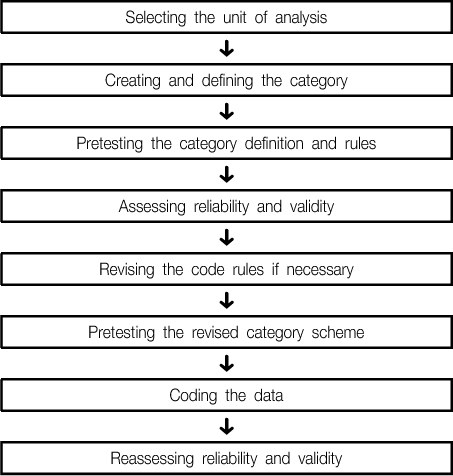J Korean Acad Nurs Adm.
2012 Dec;18(4):460-473.
Nursing Core Competencies Needed in the Fields of Nursing Practice for Graduates in Nursing
- Affiliations
-
- 1Seoul Women's College of Nursing, Korea.
- 2College of Nursing, Chonbuk National University, Korea. awesomeprof@jbnu.ac.kr
Abstract
- PURPOSE
This study was done to provide information on issues of nursing core competencies needed in the fields of nursing practice for graduates in nursing, from the perspective of nursing managers, and to make suggestion for improving nursing education programs.
METHODS
Ten nursing managers participated in this study. They were in charge of clinical nursing education in the fields of nursing practice. Data were collected using focus group interviews and analyzed with the content analysis methodology of Downe - Wamboldt's.
RESULTS
Six types of nursing core competency - therapeutic nursing competency, professional nursing competency, administrative nursing competency, humanistic nursing competency, relational nursing competency, and personal nursing competency - were identified as nursing core competencies needed in the fields of nursing practice for graduates in nursing.
CONCLUSION
Results of the study show important evidence for decision-making about nursing curriculum revision based on nursing core competency, both in the classroom and in nursing practice areas. These results should contribute to the development of evaluation indicators for nursing students or new nurses. Further research is required to measure degree of nursing core competency in graduates of nursing and to identify the effect of competency-based education for improving nursing core competency.
MeSH Terms
Figure
Reference
-
1. Byeon YS, Lim NY, Kang KS, Sung MS, Won JS, Ko IS, et al. Clinical nursing competency for new graduate nurses: A grounded theory approach. J Korean Acad Fundam Nurs. 2003. 10:47–56.2. Campbell B, Mackay G. Continuing competence: An Ontario nursing regulatory program that supports nurses and employers. Nurs Adm Q. 2001. 25(2):22–30.3. Chaung SK. Critical thinking disposition, problem solving ability, and clinical competence in nursing students. J Korean Acad Fundam Nurs. 2011. 18:71–78.4. Choi JS, Eun Y. A study on the clinical competence according to clinical ladder of operating room nurses. J Korean Acad Soc Nurs Educ. 2006. 12:60–69.5. Chung SY. Nursing informatics competencies of university hospital nurses in Korea. 2012. Seoul, Korea: Ewha Womans University;Unpublished master's thesis.6. Downe-Wamboldt B. Content analysis: Method, applications, and issues. Health Care Women Int. 1992. 13:313–321.7. Ha NS, Choi J. An analysis of nursing competency affecting on job satisfaction and nursing performance among clinical nurses. J Korean Acad Nurs Adm. 2010. 16:286–294.8. Hall LW, Moore SM, Barnsteiner JH. Quality and nursing: Moving from a concept to a core competency. Urol Nurs. 2008. 28:417–425.9. Hsu LL, Hsieh SI. Testing of a measurement model for baccalaureate nursing students' self-evaluation of core competencies. J Adv Nurs. 2009. 65:2453–2463. http://dx.doi.org/10.1111/j.1365-2648.2009.05124.x.10. Jang KS. A study on establishment of clinical career development model of nurse. 2000. Seoul: Yonsei University;Unpublished doctoral dissertation.11. Ji EO. A study on field adaptation of new nurses. 2009. Seoul, Korea: Ewha Womans University;Unpublished master's thesis.12. Kang YS, Lee SJ, Kim IJ, Ahn KH. A measurement scale development of nursing competence for nurses working in general wards. J Korean Acad Nurs Adm. 2008. 14:219–228.13. Kim MS. Role of self-leadership in the relationship between organizational culture and informatics competency. J Korean Acad Nurs. 2009. 39(5):731–740. http://dx.doi.org/10.4040/jkan.2009.39.5.731.14. Kim SY, Joung SE, Hwang CI. A comparison on general education curriculum of 4-year and 3-year nursing schools in Korea. J Korean Acad Nurs. 2011. 41:101–109. http://dx.doi.org/10.4040/jkan.2011.41.1.101.15. Korean Accreditation Board of Nursing Education. Study of core nursing competence. 2011. 05. Seoul, Korea: Paper presented at the public hearing of the nursing education core competence (focused on basic nursing skills) evaluation.16. Korean Accreditation Board of Nursing Education. Nurses' core competencies and nursing education learning outcomes. 2012. Retrieved December 10, 2012. from http://kabon.or.kr/HyAdmin/upload/goodFile/120121127132143.pdf.17. Korean Accreditation Board of Nursing. Nursing education accreditation guidelines. Symposium conducted at the explanatory meeting of the '2012 Nursing Education Accreditation Evaluation. 2012. 05. Seoul, Korea.18. Kwon IG, Jung KH, Cho HS, Hwang JW, Kim JY, Jeon KO. Development and validation of the core competency evaluation tool for new graduate nurse's preceptor. J Korean Acad Nurs Adm. 2002. 8:535–549.19. Lenburg CB. The framework, concepts and methods of competency outcomes and performance assessment (COPA) model. Online J Issues Nurs. 1999. Retrieved March 25, 2011. 4(2):Manuscript 2. from http://www.nursingworld.org/MainMenuCategories/ANAMarketplace/ANAPeriodicals/OJIN/TableofContents/Volume41999/No2Sep1999/COPAModel.aspx.20. McLagan P. Great ideas revisited. Train Dev. 1996. 50:60–65.21. Meretoja R, Isoaho H, Leino-Kilpi H. Nurse competency scale: Development and psychometric testing. J Adv Nurs. 2004. 47:124–133. doi: 10.1111/j.1365-2648.2004.03071.x.22. Morgan DL. SJ Kim SE Oh Y Eun HM Son MS Yi . Focus groups as qualitative research. 1997. Seoul: Koonja;Original work published 1997.23. Park JH. Study of abilities required to develop for student in nursing education. J Korean Acad Nurs Adm. 2011. 17:74–87.24. Patton MQ. Qualitative evaluation and research methods. 1990. 2nd ed. Thousand Oaks, CA: Sage Publications.25. Song Y. A correlation study on self-efficacy, disposition to critical thinking and nursing competency of new nurses. J Korean Acad Fundam Nurs. 2009. 16:56–63.26. Sung YH, Jeong JH. Defining the core competencies of the nurses in a tertiary hospital and comparing different units based on their respective characteristics. J Korean Acad Nurs Adm. 2006. 12:76–93.27. Utley-Smith Q. 5 competencies needed by new baccalaureate graduates. Nurs Educ Perspect. 2004. 25:166–170.28. Yang NY, Han SS. Cognition of the preceptors on the preceptor's role stress and competency pre-post preceptorship experience. J Korean Acad Soc Nurs Educ. 2004. 10:262–270.29. Youk SY. Nursing competency and indicator development by emergency nurse's clinical ladder. J Korean Acad Nurs Adm. 2003. 9:481–494.
- Full Text Links
- Actions
-
Cited
- CITED
-
- Close
- Share
- Similar articles
-
- Development of Objectives in Nursing Clinical Education based on the Nursing Core Competencies
- Strategy for Improving Core Nursing Competency-based Education
- A Structural Equation Model on Core Competencies of Nursing Students
- A Comparative Study between American Public Health Nurse Core Competency and Community Health Nursing Practicum in a Province
- Development of the Core Task and Competency Matrix for Unit Managers


